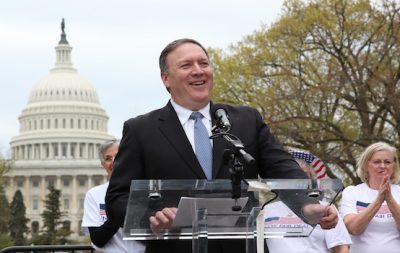An Iran Policy of Regime Change in All But Name

Mike Pompeo removes any doubt about the purpose of the administration’s Iran policy of regime change in all but name:
U.S. Secretary of State Mike Pompeo has said that “the sanctions on Iran have an ultimate goal” of “creating an outcome where the Iranian people could have better lives than they have today under this tyrannical regime”.
In other words, the sanctions are intended to create so much misery and upheaval that they cause the regime to collapse. That means there is nothing that the Iranian government could do short of abolishing its current political system that would satisfy the administration so that they would agree to lift the sanctions that they illegitimately reimposed last year. We know Iran’s government isn’t going to do that. Contrary to what Pompeo claims here, this wouldn’t lead to “an outcome where the Iranian people could have better lives.” It threatens to plunge their country into disorder if it “works,” and it promises economic ruin for tens of millions of people no matter what happens to the government. There is no realistic scenario where the Iranian people aren’t left worse off at the end than they were before the sanctions were reimposed.
We also know that the sanctions primarily harm the civilian population by ravaging their economy, impeding their ability to import basic goods, destroying their savings, driving up their cost of living, bankrupting their businesses, and taking away their jobs. Were it not for the reimposed sanctions, many Iranians would already be enjoying somewhat better lives as a result of foreign investment and trade following the successful negotiation of the JCPOA. Because of the sanctions, that prospect of a moderately better future has been cut off for many years to come. The idea that the people responsible for the Iran sanctions actually desire “better lives” for the population that they are strangling is a sick joke, and news outlets that don’t acknowledge the obvious contradiction between administration rhetoric and the effect that administration policies are having on the civilian population in Iran are failing in their reporting.
*
Note to readers: please click the share buttons above. Forward this article to your email lists. Crosspost on your blog site, internet forums. etc.
Daniel Larison is a senior editor at The American Conservative, where he also keeps a solo blog. He has been published in the New York Times Book Review, Dallas Morning News, Orthodox Life, Front Porch Republic, The American Scene, and Culture11, and is a columnist for The Week. He holds a PhD in history from the University of Chicago, and resides in Dallas. Follow him on Twitter.
Featured image is from Wikimedia Commons
The Globalization of War: America’s “Long War” against Humanity
Michel Chossudovsky
The “globalization of war” is a hegemonic project. Major military and covert intelligence operations are being undertaken simultaneously in the Middle East, Eastern Europe, sub-Saharan Africa, Central Asia and the Far East. The U.S. military agenda combines both major theater operations as well as covert actions geared towards destabilizing sovereign states.
- ISBN Number: 978-0-9737147-6-0
- Year: 2015
- Pages: 240 Pages
List Price: $22.95


